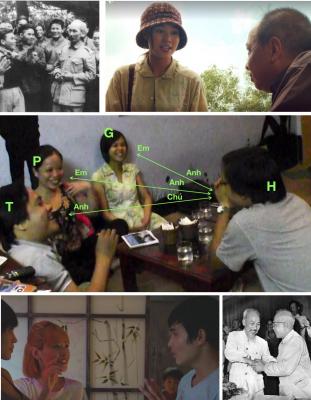"Respect those above, yield to those below": Conceptualizing social hierarchy in Vietnamese interlocutor reference
A Lecture by Jack Sidnell, Professor, University of Toronto
Matrix is located on the 8th floor of Barrows Hall, on the UC Berkeley campus, near Telegraph and Bancroft Avenues, just up the hill from Sather Gate. There are entrances at both ends of the building, but only one of the elevators on the eastern side goes directly to the 8th floor. You can alternatively take the elevator to the 7th floor and walk up the stairs.

Please join us on February 7, 2020 at 4pm as Jack Sidnell, Professor of Anthropology at the University of Toronto, will deliver a lecture entitled, "'Respect those above, yield to those below': Conceptualizing social hierarchy in Vietnamese interlocutor reference." This event is co-sponsored by the UC Berkeley Department of Anthropology. RSVP HERE
Abstract
In Vietnamese, speakers make reference to themselves and to their addressees using a wide range of forms. Pronouns, names and titles are all quite common, but, in conversation at least, kin terms constitute the default, unmarked means for accomplishing interlocutor reference. Because Vietnamese does not have reciprocally usable kin terms (equivalent to English brother or sister), the extended use of these forms in reference to persons who are not genealogical relatives inevitably invokes an age and/or generation-graded hierarchical system modelled after the family unit. In this form of social organization, persons are tied to one another, as they are in a family, by mutual relations of entitlement and obligation, and the ethics of interpersonal hierarchy which this implies is captured by the oft-cited expression, kính trên, nhường dưới ‘respect those above, yield to those below’.
My presentation considers a single conversation among four persons in which the use of sibling terms performatively constitutes the social relations between the participants on the model of an hierarchically organized family unit, with seniors taking precedence over juniors while at the same time “yielding” to them where appropriate. While this organization into senior and junior provides the default, baseline social arrangement, the participants in this conversation also, at times, report upon or collaboratively imagine quite other possibilities. In these other contexts, whether reported or imagined, the participants make reference to one another using occupational titles, names, and pronouns that cast social organization not in terms of mutual ties of entitlement and obligation, but rather in terms of top-down relations of power and authority. I conclude by considering the historical roots of these alternative conceptions in Confucian tradition, proposals for nationalist reform, and the Marxist revolutionary movement of the early-to-mid 20th century, and by pointing to some apparently newer social imaginaries articulated in contemporary film.
Research Bio
Jack Sidnell has conducted field research in the Caribbean, Vietnam, India, and North America. The structures of social interaction have been the object of long-term study. Other research has focused on the anthropology of knowledge and the ontology of action. His current research examines interlocutor reference (i.e. reference to speaker and hearer) in Vietnamese across a range of contexts, including those involving the socialization of young children and those involving forms of public address (e.g. television and radio). This research poses a set of broad theoretical questions concerning the linguistic mediation of social relations and the consequences of linguistic diversity for social life.



